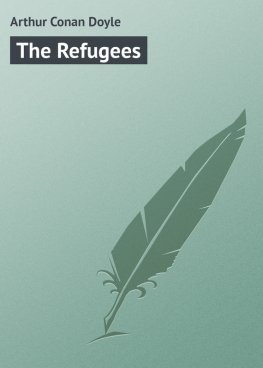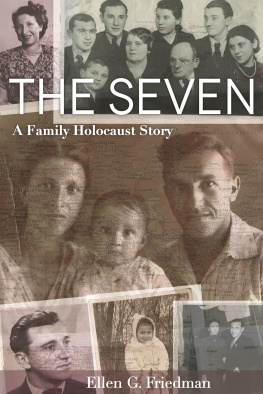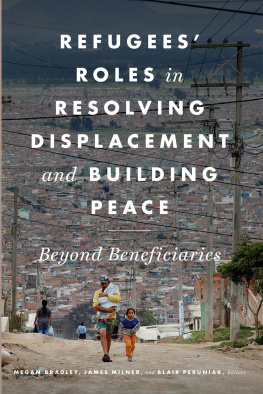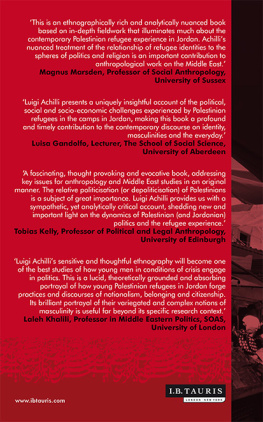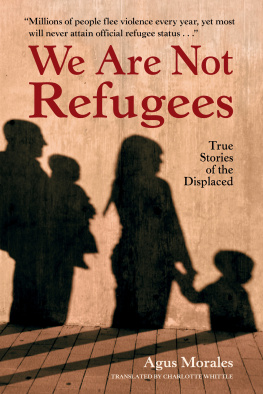Table of Contents
Edited by
Mark Greengrass and Pamela Pilbeam
This series is published in collaboration with the UK Society for the Study of French History. It aims to showcase innovative short monographs relating to the history of the French, in France and in the world since c.1750. Each volume speaks to a theme in the history of France with broader resonances to other discourses about the past. Authors demonstrate how the sources and interpretations of modern French history are being opened to historical investigation in new and interesting ways, and how unfamiliar subjects have the capacity to tell us more about the role of France within the European continent. The series is particularly open to interdisciplinary studies that break down the traditional boundaries and conventional disciplinary divisions.
Titles already published in this series
Catholicism and children's literature in France: The comtesse de Sgur
(17991874)Sophie Heywood
The routes to exile
France and the Spanish Civil War refugees, 19392009
SCOTT SOO
Manchester University Press
Manchester and New York
distributed in the United States exclusively by Palgrave Macmillan
Copyright Scott Soo 2013
The right of Scott Soo to be identified as the author of this work has been asserted by him in accordance with the Copyright, Designs and Patents Act 1988.
Published by Manchester University Press
Oxford Road, Manchester M13 9NR, UK
and Room 400, 175 Fifth Avenue, New York, NY 10010, USA
www.manchesteruniversitypress.co.uk
Distributed in the United States exclusively by
Palgrave Macmillan, 175 Fifth Avenue, New York,
NY 10010, USA
Distributed in Canada exclusively by
UBC Press, University of British Columbia, 2029 West Mall,
Vancouver, BC, Canada V6T 1Z2
British Library Cataloguing-in-Publication Data
A catalogue record for this book is available from the British Library
Library of Congress Cataloging-in-Publication Data applied for
ISBN 978 0 7190 86915
First published 2013
The publisher has no responsibility for the persistence or accuracy of URLs for any external or third-party internet websites referred to in this book, and does not guarantee that any content on such websites is, or will remain, accurate or appropriate.
Typeset
by Toppan Best-set Premedia Limited
Preface
On a hot day in June 2000, it took me some time to locate the monument to the refugees who were interned on the beach of Argels-sur-Mer in 1939, and the stele marking the place where some of those refugees were buried. It would not be so difficult to find these today partly because the history of these camps and the internees has become much more widely known. In 2009, the seventieth anniversary of the Spanish republicans arrival in France was recalled with an impressive array of commemorations across the country. The various events signalled that the Spanish republican exile in France was fast becoming an integral part of French, but also Spanish and European history.
Much of our knowledge about the history of the Spanish republican exile has come from the refugees memoirs and the work of French and Spanish historians. While there has also been pioneering work in the English language, there are few books and only one general overview by Louis Stein published in 1979 when access to the relevant state archives in France was limited. My aim is to provide an updated account in the English language and to advance knowledge of the subject through a consideration of exile in relation to the refugees lived experiences and memory activities. Given the contemporary trend of nation-states in neglecting refugees rights, understanding the personal and long-term impact of the French reception of the Spanish republicans is as important now as it has ever been.
I am grateful to a number of institutions and individuals for supporting this project. The Economic and Social Research Council and the Arts and Humanities Research Council financed the postgraduate research from which this book emerged. I would also like to thank the staff at the French, Spanish and British National Archives, as well as those at the numerous Archives Dpartementales. There are three friends in particular who I would like to mention. Jean-Jacques Ral, Hlne Tallet and Francisco Perez of the former CIRAS archive guided me through the documents of the Spanish Libertarian Movement in exile under very difficult circumstances. Jean-Jacques was steadfastly enthusiastic about this project even though he was enduring the final stages of terminal cancer. Both Jean-Jacques and Hlne (Lna) insisted that I continue working with the archives, even though these were based within their own home, and Francisco was always on hand for any questions. I very much regret that neither Jean-Jacques nor Francisco lived to see the publication of the book.
In addition to the archival work, I was very fortunate to listen to so many people about their experiences and memories. I would like to express my deep gratitude to everyone for generously giving up their time and hope they will forgive me for not being able to incorporate all of their stories here. The names of those whose oral histories feature in this book can be found in the bibliography. These oral-history interviews have provided an essential insight into exile as well as inspiring successive cohorts of students to learn more about the subject. In the process, these students have both challenged and advanced my understanding of the Spanish republican exile and I would therefore like to thank the students who have studied FREN 3025 An ambivalent asylum: the history and memories of refugees in early twentieth-century France, and TRANS 6002 Problematizing the national.
I have benefited from the interdisciplinary context of the University of Southampton and the collegiate ethos of Modern Languages, and very much hope this will be able to survive the incessant market-inspired challenges to British academia. I owe thanks to virtually all of my colleagues in Modern Languages as well as others in History, Sociology and Geography. But a special mention must go to Jackie Clarke, who kindly took time from her own monograph to provide feedback on various chapters. The same applies to another good friend and historian, Evgenios Mikhail.
For his infectious enthusiasm, inspiration, invaluable advice and generous hospitality, my deep gratitude goes to Rod Kedward. Sharif Gemie also deserves a special mention for his encouragement and critical feedback during the genesis of this book. I am also grateful to all the staff at Manchester University Press and the Series Editors, Mark Greengrass and Pam Pilbeam, for their advice.
.
Friends as well as family have been incredibly supportive. Je remercielescopains de Saint Michel in Bordeaux and especially Fred Labes, who has followed this project from the start. Thanks also to Jean-Bernard and Marylne for allowing me to hijack their salon


